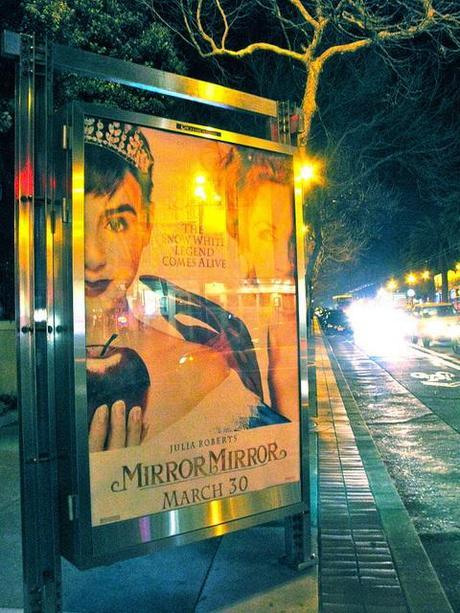
The San Francisco traffic reflected in a Mirror Mirror advert featuring Lliy Collins and Julia Roberts. Photo credit: torbakhopper http://www.flickr.com/photos/gazeronly/6893915247/
Fairytales are so hot right now.
Mirror, Mirror, starring Julia Roberts, Lily Collins (Phil’s daughter) and Armie Hammer is the first of two cinematic retellings of the brothers Grimm’s fairytale Snow White and the Seven Dwarves to hit our screens this year (Snow White and the Huntsman, starring Kristen Stewart of Twilight fame, is due out in July). With ABC TV series Once Upon a Time, also inspired by the apple-eating princess, starting on Channel Five in April it looks like fairytales are the new comic books/vampires.
Director Tarsem Singh’s version retains the main elements of the story, with Snow White exiled to the woods by her wicked stepmother, who is jealous of her youthful beauty. However Julia Roberts’s cash-strapped Queen also sees Snow as her main rival for the rich Prince Albert, who she wants to marry so they can “live affluently ever after.” Snow White is rescued from the shadowy beast that lurks in the forest by the Seven Dwarves, who are Robin-hood style bandits and who help her grow from the damsel in distress to a defiant young woman bent on taking her throne back. But is Mirror Mirror any good? Or does it favour style over substance? And is this age-old story relevant to modern audiences?
Whimsical and witty? Robbie Collin in the Telegraph found the film to be “an exuberantly charming fairy story… in which bee-stung lips are achieved with real bees’ stings and puppy love can make a man behave like an actual puppy.” Amelia Proud in the Daily Mail flagged it as a “whimsical, witty Princess Bride-style adaptation.”
Anachronistic and mirthless? Manohla Dargis deplored the script in the New York Times for its “forced lightness and scattershot jokes” while Justin Chang in Variety called it a “mostly mirthless affair” highlighting grating anachronisms such as “agree to disagree,” “I just need to process” and, least magical of all: “your tax dollars.” For Chang, the film “displays an unseemly delight in its own putative cleverness, taking its tonal cues from the self-satisfied sneer worn by its reigning villain.”
“Really, they should be bashful that the film leaves more grumpy faces than happy ones. ‘Dopey’ is too good a word for it,” snarked Joe Neumeier in the New York Daily News.
Style over substance? Some critics were charmed by the film’s visual excess: The Telegraph’s Collin praised the costumes, noting, “Every outfit in Mirror Mirror is a masterpiece…” But Dargis attacked Singh in the New York Times, arguing that the elaborate visuals meant that “he’s a better window dresser than a movie director.” The actors, she wrote, “look as pretty as fairy-book illustrations, but their performances are similarly one dimensional.” Justin Chang agreed in Variety: In “scene after scene, the filmmakers seem to be seeking new visual definitions for ‘ornate,’ ‘opulent’ and ‘gilded’”, he said, but “this gaudy, over-frosted cream puff of a movie … ultimately suffers the same fatal flaw as Julia Roberts’ evil queen: It doesn’t really care about anything except how pretty it looks.”
“I’ve read so many stories where the prince saves the princess. I think it’s time we change that ending. This is my fight.” Snow White fights for a new ending in Mirror, Mirror.
A 21st century Princess. Lily Collins’s Snow, described in the Telegraph by Robbie Collin as “Audrey Hepburn with the eyebrows of Liam Gallagher”, “gets a self-conscious, you-go-girl makeover” from the Dwarves. But how successful that makeover is depends: “Whether that makes her a feminist heroine or just another self-actualized Disneyesque waif,” sneered Manohla Dargis in the New York Times, “may depend on your idea of empowerment.” For Justin Chang in Variety, the “mandatory weapons training and political activism” is “in line with the film’s unsparingly hip, politically correct girl-power sensibility,” but as unconvincing as the “bargain-basement Jabberwocky” that Snow battles.
Age before Beauty. Elizabeth Greenwood in The Atlantic drew our attention to the way that art mirrored life in Mirror Mirror for Julia Roberts. For the aging actresses of Hollywood, “maintaining one’s status as the fairest of them all isn’t just a vain trifle; it’s survival.” She continued, “What is a glamorpuss to do once she is cast not as the milkmaid but as the stepmother? In Julia Roberts’s case, you send the whole thing up in a big-budget star vehicle.” Her Queen is a “combination of Marie Antoinette, Samantha Jones, and Don Rickles…the true feminist heroine of the film because she is dead set on maintaining power.” When Mirror Mirror’s Snow White ultimately dismisses her rival with the sneer “age before beauty”, it is a even more devastating fate for the Queen than being struck by lightening (as she was in the Disney version) or dancing in red-hot iron shoes until she dropped down dead (as in Brothers Grimm).

